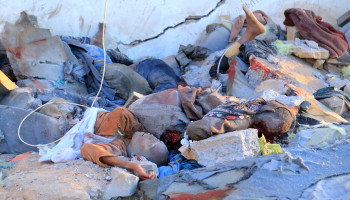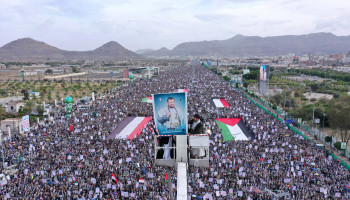After the UN organization becomes a non-neutral party, Yemeni official exposes the World Food Program
الأحد, 22 نوفمبر 2020

The international community continues its inhuman duties by providing international cover for war crimes committed by the US-Saudi-led aggression coalition against Yemen.
The briefings of senior United Nations officials to the Security Council, at its last session on Yemen, are clear evidence of UN collusion with Saudi Arabia and the UAE. They sought, including the director of the World Food Program, David Beasley, to narrate the allegations and falsify the facts of what is happening on the reality. He tried to blame Sanaa with regard to reducing international aid to the areas administered by the National Salvation Government, ignoring at the same time the continuing aggression and the land, air and sea blockade imposed on Yemen.
A member of the Supreme Political Council, Mohammad Ali Al-Houthi, confirmed that the real motives for easing WFP aid in those areas are purely political and linked to America's agenda and its aggressive coalition against Yemen, and not as said by United Nations officials.
Al-Houthi explained in tweets on “Twitter” that the food program, which claims to have saved the people from starvation, is the same one who kills the Yemeni people, and prevents aid from reaching Sanaa and other free provinces as America wants, and an extension of what it is practicing with the allied countries in the aggression of an economic war, siege and starvation against the Yemeni people.
The member of the Supreme Political Council emphasized that the tasks of the United Nations and its officials are limited to finding justifications and excuses for all collective punishment by the countries of the aggression and the government of mercenaries against the Yemeni people. They include reducing aid, detaining oil derivative ships and preventing them from reaching citizens in the free provinces through linking it to other political issues that affect the country's sovereignty and the people's interests.
Al-Houthi pre-empted the second meeting of international agency officials on Yemen, which was held Thursday, by calling on the senior participants to put in place severe and strict controls that limit the practices of the World Food Program, and the political classification it is doing for those who reject America's policies.
He said, "Humanitarian work must remain humanitarian and not be subject to any other considerations, and this should be a top priority for the review developments and plan for the future meeting."
Summit on the humanitarian situation
Last July, Al-Houthi, proposed to the Swedish Foreign Ministry’s humanitarian affairs official and the European Union’s humanitarian file official to organize a video conference meeting that brings together Yemeni officials concerned with the humanitarian file with European Union representatives as well as organizations that have problems such as The World Food Program to discuss all issues and develop the necessary solutions. Because each party has specific information on which to base its attitudes, but when everyone sit together to discuss the issues, the picture will become clearer.
In his meeting with them via video, he expressed his readiness to hold a summit on the humanitarian situation, so that an agreement is reached that will be signed and implemented on the ground in the presence of officials who have the authority to make decisions and not as it happens with representatives of some organizations with whom certain issues are agreed upon and then not accepted after that from the main officials of those organizations. He stressed that the World Food Program of the United Nations has become the US Food Program, subject to US policy.
Al-Houthi has always criticized, on Twitter, the failure of the Food Program to comply with the generally accepted rules and methods in dealing with the humanitarian situation, describing that as attempts to shirk its responsibilities in facing the risks of famine resulting from the aggression and siege facing Yemen.
In an interview with Al-Mayadeen TV, at the end of last October, he wondered the allegations by the Director of the World Food Program about obstacles that Sana'a places in the way of the delivery of aid, who stated that the program has not received the full support that would enable it to face the threat of famine that threatens the Yemeni people.
He added, “These allegations cannot be believed because those work for the agenda of America and the coalition countries in the aggression against Yemen and the siege of Yemenis completely, through escalating the detention of oil derivative ships and not allowing aid and goods to enter the Republic of Yemen and anything through the port of Hodeidah.
Al-Houthi emphasized that it is not possible for those who besiege the Yemeni people and place the famine as sword on the necks of the Yemenis to show themselves as protectors of the human being and his rights.
He revealed a final agreement signed, in October, between the WFP and the Coordination Council in Sana'a, waiting to be implemented by it.
Recommendations on paper
Recently, the second international meeting of officials on Yemen came out with recommendations to donors and governments. It included improving humanitarian access through strengthening high-level coordinated advocacy and dialogue for the arrival of quality humanitarian aid. Provided that this includes visits within the country by senior officials, and effective participation with all authorities, amending the sixteen original criteria to include additional operational parameters to enhance confidence-building, and a collective and strong stance to discourage suspension of aid.
With regard to humanitarian funding, the recommendations stressed the need to ensure that donors who pledged funds that have not been disbursed to do so as quickly as possible, to restore and increase funding for the humanitarian response in Yemen, and to ensure that discussions about financing the humanitarian response take priority over the size and severity of the humanitarian crisis in Yemen, especially the deteriorating food security situation.
On overcoming the economic crisis, the meeting came out with recommendations that included the necessity to provide an economic rescue package for Yemen, support social protection programs and safety nets, and preserve income from remittances by facilitating transfer channels and reducing transfer fees. The also included that put local parties under pressure to reach a long-term agreement on fuel and commercial imports, as well as pressure on the warring parties to keep all ports and airports throughout Yemen fully open and operational, and to broker an agreement between all parties to develop a plan for a technocratic central management of the Central Bank of Yemen, and coordinate to address conflicting monetary and fiscal policies.
The recommendations also included seeking to bring about an early recovery by increasing flexible multi-year humanitarian funding, supporting and advocating for early recovery programs, while ensuring that urgent needs are also met, and supporting the design of humanitarian programs, with a special focus on improving women's resilience. They in addition included continuing to support programs that work to repair existing infrastructure or build new one to increase civilian access to basic services and provide social services, strengthen support, build capacity and provide resources for local and national NGOs.
It is noteworthy that the UN organization is launching arbitrary accusations against the Salvation Government in order to evade what was agreed upon, regarding converting in-kind food aid into cash assistance, after it made sure that quantities of spoiled food had been entered and the program tried to distribute it to the beneficiary families more than once.
In addition to that, the United Nations asides the relief file in favor of the aggression coalition. While the affiliated organizations take the crumbs of what they provide to some Yemeni families in the form of food aid as a means to trade in the suffering of Yemenis, to earn money at their expense. They also did so to try to beautify the ugliness of their attitude that support the aggression against Yemen, which is the main reason for all the economic, living and humanitarian crises Yemen is going through.
Despite the limited aid provided by the United Nations, compared to the funds it receives annually, which exceeded $ 17 billion in the past five years, under the banner of relieving and saving Yemenis from death. However, up to 90 percent of these sums are spent in the form of operational expenses and wages and salaries for the employees of the UN and non-governmental organizations cooperating with it. Above all, it is working to exploit the relief and humanitarian work to achieve political gains and other goals related to the agendas of the aggression coalition.
Y.A






